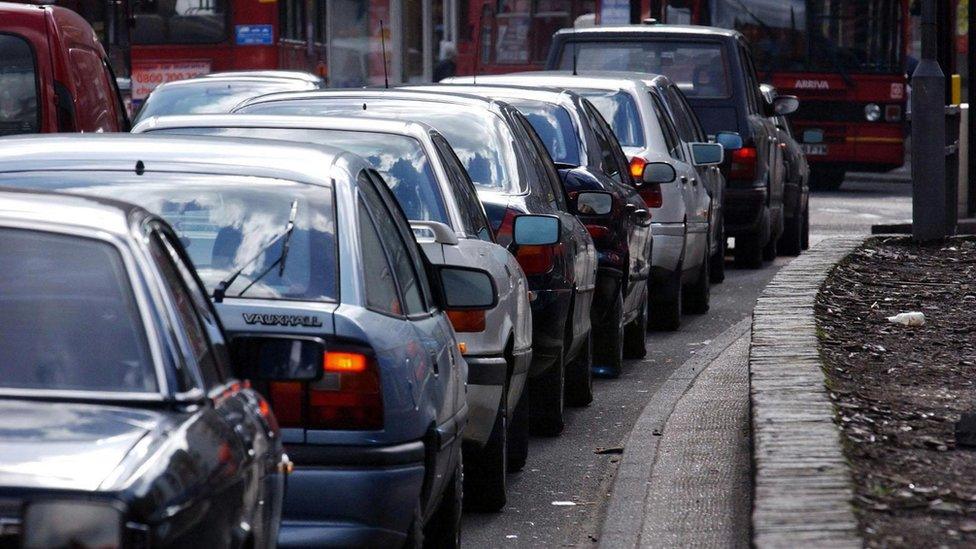Do cyclists get enough legal protection?
- Published
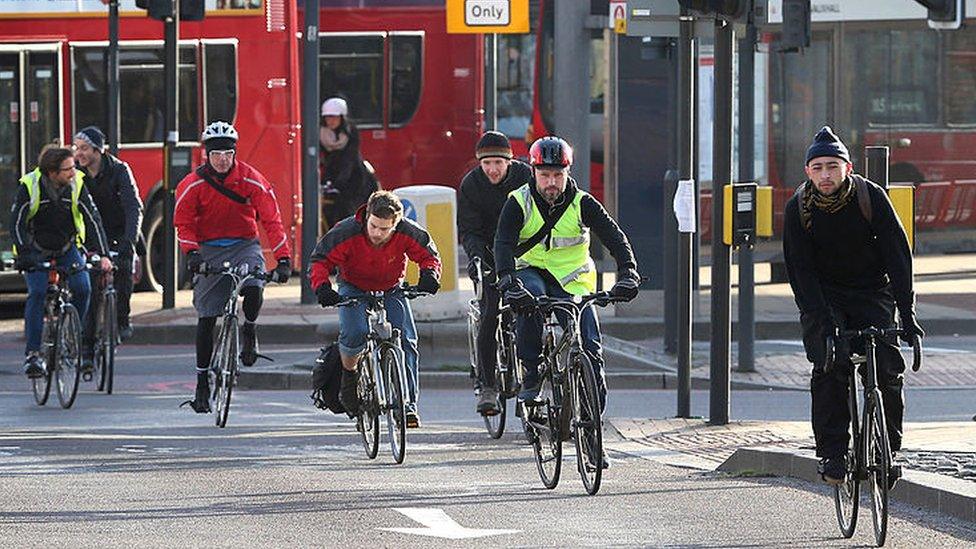
Campaigners are concerned that many drivers who seriously injure cyclists are not convicted
Cycling campaigners who brought a private prosecution against a motorist involved in a fatal crash say police and the Crown Prosecution Service (CPS) are often reluctant to press charges. Yet, rather than automatically jail bad drivers, some are proposing another approach.
Driver Gail Purcell was found not guilty of causing the death by careless driving of cyclist Mick Mason following a private prosecution paid for through crowdfunding.
The decision to prosecute privately was made after the Metropolitan Police chose not to pass the case to the CPS.
The Cyclists Defence Fund, set up by the charity Cycling UK to help with legal cases and raise awareness, believes the "over-reliance" on custodial sentences for bad driving offences is discouraging the police and CPS from pursuing more prosecutions.
It wants more use to be made of driving bans rather than jail terms, saying it believes the authorities decline to prosecute dangerous driving offences in particular due to a "justifiable" fear jurors will simply not convict.
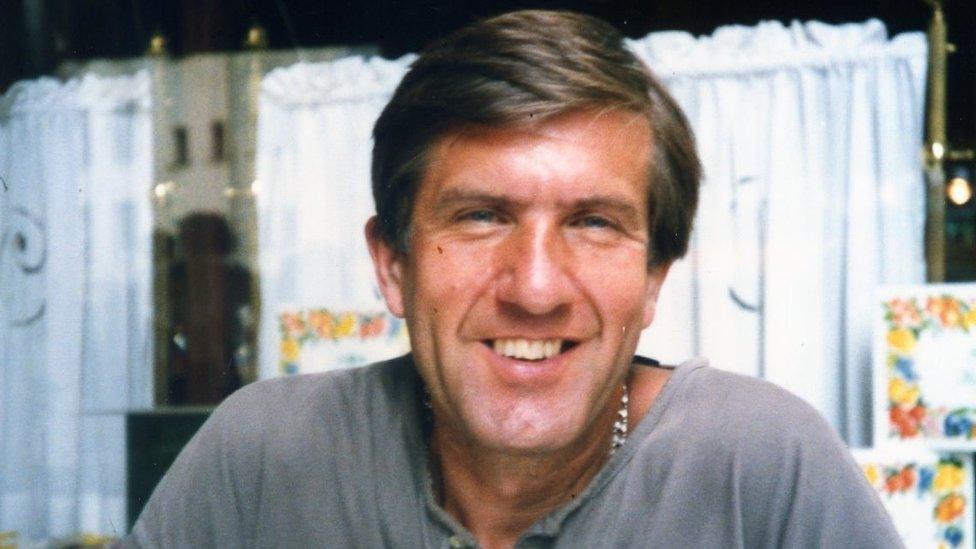
Crowdfunding brought a prosecution following the death of cyclist Michael Mason
"It is a big decision to find someone guilty of an offence that will send them to prison," said Roger Geffen, policy director of Cycling UK.
"And we'd expect there to be some reluctance to do that."
While Cycling UK wants to see an end to the term "careless driving" used in cases where someone was maimed or even killed, it does not believe prison is always the answer.
"In a lot of collisions, the driver wasn't an awful human being, but simply was not paying attention," Mr Geffen said. "The consequences of this can be serious and even fatal.
"That doesn't mean you need to lock them up and throw away the key. A significant driving ban may be much more appropriate unless they were wilfully reckless or haven't respected a ban."
Across Great Britain, about 100 cyclists die and more than 3,000 are seriously injured on the roads every year.
Official figures show that, while overall safety on the roads has been improving, cyclists were at greater risk of serious injury in 2015 than they were in 2005, even though the rate of deaths is down.
Yet a BBC Newsbeat investigation, which used the Freedom of Information Act to break down the figures for road safety, found fewer than half of drivers convicted for killing a cyclist were jailed in 2013.
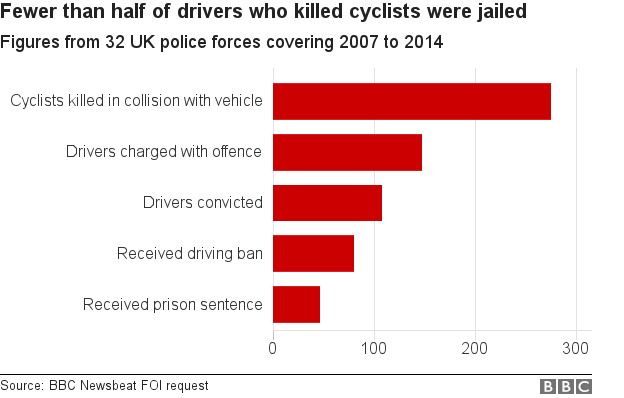
Oliver Jeffcott, a solicitor in London who blogs as The Cycling Solicitor, external, said cyclists were increasingly using helmet cameras to gather evidence. He said the police and CPS would be unlikely to progress a case to the courts unless there was a strong likelihood of conviction.
"Cyclists are getting fed up with not having the full amount of support in cases that should be taken forward," he added.
In some cases he had investigated, he said prosecutions had been hampered by the fact cyclists were too badly injured in a crash to supply evidence.
"Although the law usually favours cyclists as the more vulnerable road user, there are cases where someone has been brutally hurt, with life changing injuries and they simply cannot remember what happened," he said. "They may have post-traumatic amnesia or a brain injury and cannot prove what happened."
Campaigners believe there is a link between the rise in injuries and cuts to road policing, although they cannot prove it.
The number of specialist road officers in England and Wales fell from 7,104 to 4,356 between 2005 and 2014.
Mr Geffen said: "The rate of cyclists killed or seriously injured has been increasing and we don't know why.
"At the point at which steeper cuts came in to road policing just after 2008-9, that's when the fall in the overall number of KSIs [people killed or seriously injured] flattened out and cyclist KSIs climbed more steeply. However, we don't have the evidence to say there's a relationship."
The government says it has been consulting on sentencing for offenders, external who kill or seriously injure others on the road, following public concern.
"The government is committed to ensuring that deaths or serious injuries on the road continue to fall, and that where they are the result of criminal behaviour, the right tools are available to deliver justice," a Ministry of Justice spokesman said.
The prosecution in the case of Michael Mason, funded by donations worth a total of £75,000, is thought to have been the first attempt at a private prosecution for causing death by dangerous or careless driving.
While the Met has said it stands by its initial decision not to pass the file on to the CPS - and the CPS has reiterated it prosecutes all cases in the public interest where there is sufficient evidence to do so - cycling campaigners believe it is likely there may be more private prosecutions in the future.
"I hope we don't have to go down the route of more private prosecutions," said Mr Geffen.
"But if we have to in order to get justice for cyclists and their families, then that is what we will do."
- Published6 April 2017
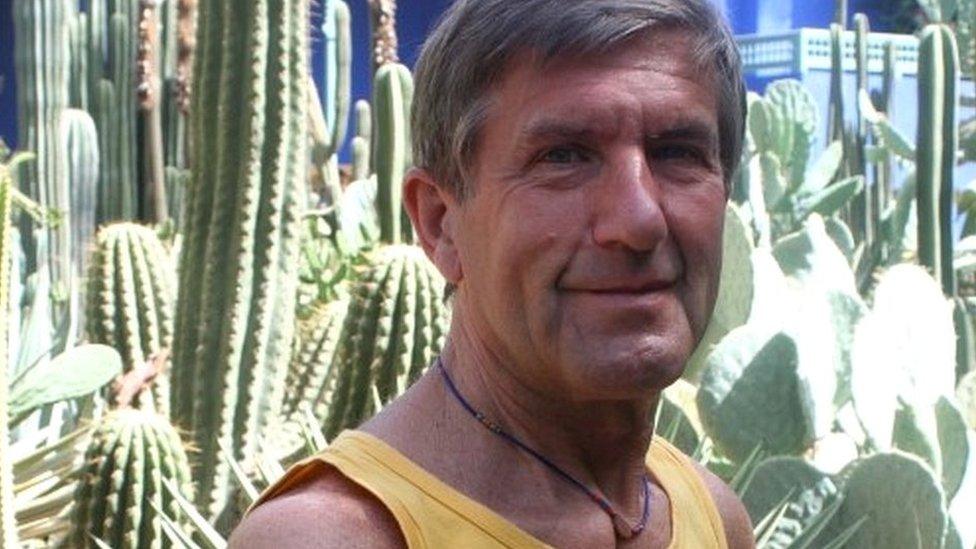
- Published15 March 2014
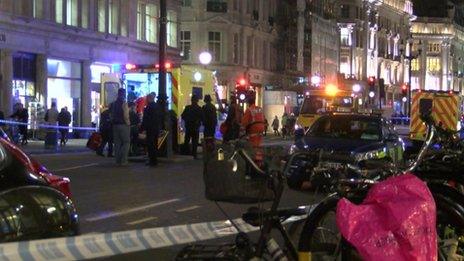
- Published15 March 2016
